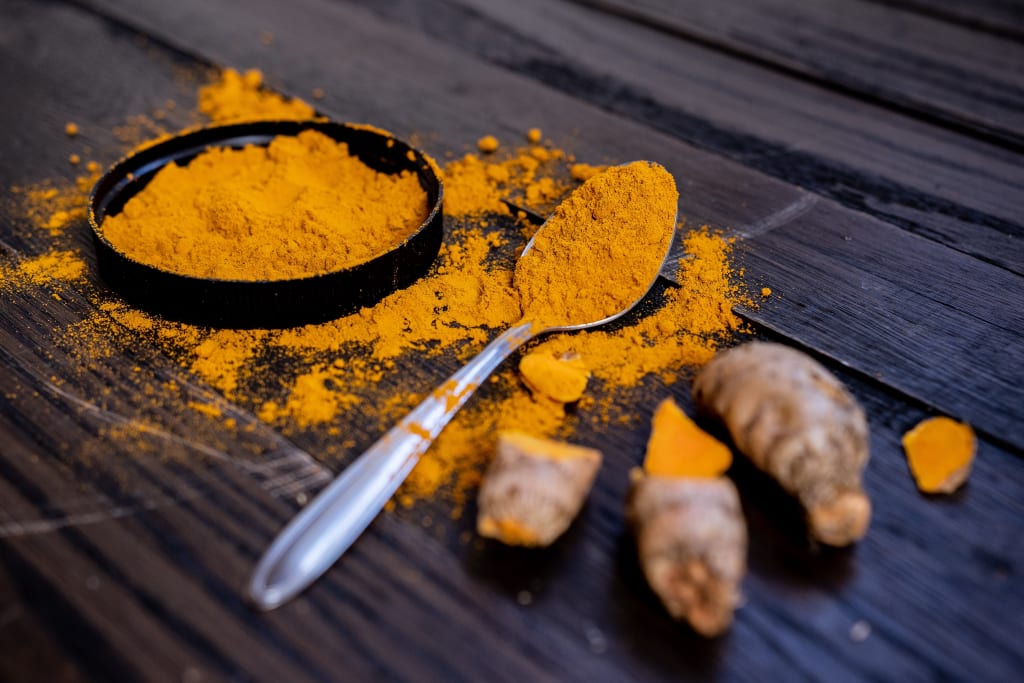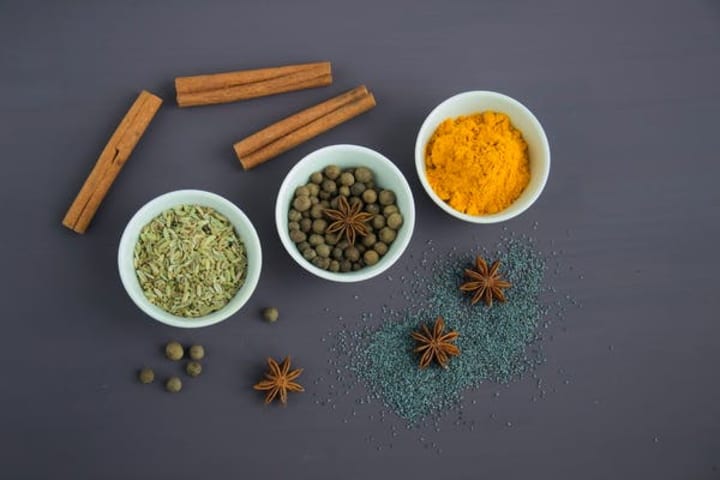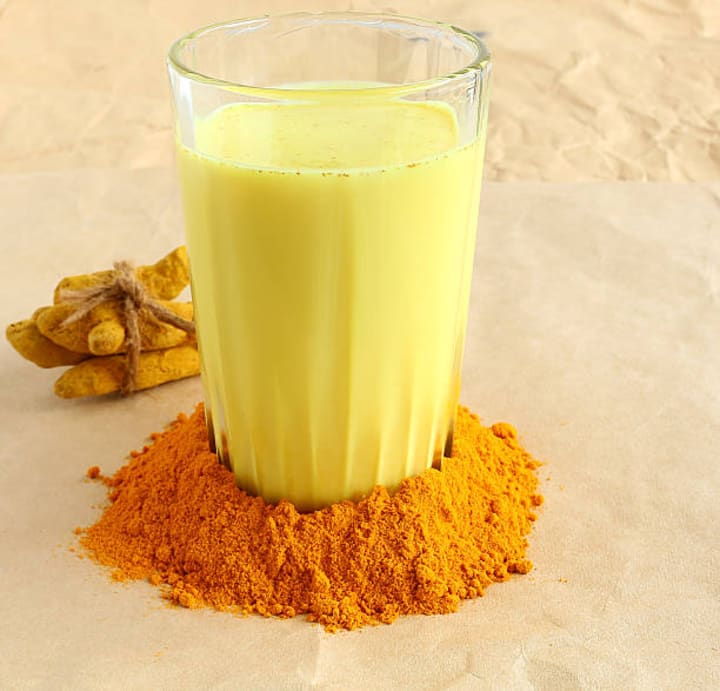
Turmeric is a plant in the ginger family that is commonly used as a spice in cooking and in traditional medicine.
Benefits of Turmeric:
1. Face Mask:

Turmeric can be used as an ingredient in face masks. Its anti-inflammatory and antioxidant properties can be beneficial for the skin. It is said that it can help to reduce the appearance of acne and fine lines, and even out skin tone.
To make a turmeric face mask:
- Mix a small amount of turmeric powder with honey or yogurt until it forms a paste
- Apply the paste to your face, avoiding the eye area
- Leave the mask on for 10-15 minutes, then rinse off with warm water.
It's important to note that turmeric can cause staining on the skin, so it's best to do a patch test before applying it to your face. Also, it's better to use it occasionally, as overuse of turmeric may cause dryness or irritation.
It's always a good idea to do a patch test before applying any new product on your face, and also, if you have any allergies or sensitivities to turmeric, it's best to avoid using it on your skin.
2. In Food Preparation:

Turmeric is a popular spice commonly used in cooking, especially in dishes from Indian and Middle Eastern cuisine. It has a warm, bitter taste and a bright yellow color, and is often used to add flavor and color to curries, soups, stews, and marinades.
Here are a few ways to use turmeric in food preparation:
- Add turmeric powder to marinades for meat, fish, or vegetables before grilling or roasting
- Mix turmeric powder into softened butter or oil to make a flavorful spread for bread
- Use turmeric powder to give an orange-yellow color and flavor to rice dishes, such as pilaf or biryani
- Add turmeric powder to soups, stews, and curries to give them a warm, earthy flavor and a bright yellow color
Turmeric is also said to have many health benefits, as it's a good source of antioxidants and anti-inflammatory compounds, that may help to reduce the risk of certain diseases.
It's worth noting that turmeric can be used in small amounts to add flavor and color to food, but overuse may turn your food bitter. Additionally, turmeric powder can also stain clothes, utensils, and surfaces, so you should be careful when using it in the kitchen.
3. Immunity Booster:
Turmeric is a spice that has been traditionally used for its medicinal properties, particularly for its anti-inflammatory and antioxidant properties. Some research suggests that it may help to boost the immune system and increase resistance to infections.
The active ingredient in turmeric is curcumin, which is responsible for its yellow color and many of its health benefits. Curcumin has been found to have immunomodulatory effects, meaning it can help to regulate the immune system and improve its function.

Here are a few ways to incorporate turmeric into your diet to boost your immunity:
- Add turmeric powder to your cooking, such as soups, curries, marinades, and spice rubs
- Drink turmeric tea made by boiling water and adding a teaspoon of turmeric powder and honey or lemon for taste
- Take turmeric supplements, but it's important to speak with a healthcare professional before starting any supplement regimen.
It's worth noting that more research is needed to confirm the full extent of turmeric's immune-boosting effects. Additionally, turmeric supplements may interact with certain medications, so it's important to speak with a healthcare professional before taking them.
4. For Injury:
Turmeric has anti-inflammatory and antioxidant properties that may be beneficial for helping to reduce pain and inflammation associated with injuries. Curcumin, the active ingredient in turmeric, has been found to have anti-inflammatory effects similar to those of some anti-inflammatory drugs.
Here are a few ways to use turmeric for injury:
Topically: Turmeric can be applied topically as a cream or oil to the affected area to help reduce pain and inflammation.
Oral consumption: Consuming turmeric in the form of supplements or adding it to your diet can help reduce inflammation in the body.
Turmeric Compress: Mix turmeric powder with a little water or oil to make a paste, apply it on the affected area, wrap it with a cloth and leave it on for 30-60 minutes.
It's worth noting that turmeric should not be used as a substitute for medical treatment or professional care. Additionally, it's important to speak with a healthcare professional before using turmeric or any other supplement if you are taking medication or have a medical condition.
Turmeric can be a great addition to your overall health regimen, but it's important to use it appropriately and not overuse it. It is best to use it in combination with other treatments and under the guidance of a healthcare professional.
Improving Brain Function and Memory:
Turmeric may have potential benefits for improving brain function and memory. The active ingredient in turmeric, curcumin, has been found to have anti-inflammatory and antioxidant properties that may help to protect the brain from damage and improve its function.
Here are a few ways to use turmeric for brain function and memory:
- Oral consumption: Consuming turmeric in the form of supplements or adding it to your diet can help improve brain function and memory.
- Turmeric latte: Mix turmeric powder with milk and honey, and enjoy it as a latte.
- Add turmeric powder to your cooking, such as soups, curries, marinades, and spice rubs
It's worth noting that more research is needed to confirm the full extent of turmeric's effects on brain function and memory, and it's not recommended to use it as the sole treatment for brain-related conditions. Additionally, turmeric supplements may interact with certain medications, so it's important to speak with a healthcare professional before taking them.
Foot Care:
Turmeric may have potential benefits for foot care due to its anti-inflammatory and antioxidant properties.
Here are a few ways to use turmeric for foot care:
Soak: Mix turmeric powder with warm water and soak your feet for 15-20 minutes to reduce inflammation and pain.
Scrub: Mix turmeric powder with a little coconut oil or honey to make a scrub, and use it to gently exfoliate the skin on your feet.
Massage: Mix turmeric powder with a little coconut oil or olive oil to make a paste, and massage it into your feet to help reduce pain and inflammation.
It's worth noting that turmeric can stain the skin and clothes, so it's best to use it sparingly, and also, it's always a good idea to do a patch test before applying any new product on your feet, and also, if you have any allergies or sensitivities to turmeric, it's best to avoid using it on your feet.
In addition to using turmeric, it is also important to take good care of your feet by keeping them clean and dry, wearing comfortable shoes, and moisturizing the skin. You should also see a podiatrist if you have any persistent or severe foot problems.
May help to alleviate symptoms of arthritis and other inflammatory conditions:
Turmeric may have potential benefits for alleviating symptoms of arthritis and other inflammatory conditions. The active ingredient in turmeric, curcumin, has anti-inflammatory properties that may help to reduce inflammation and pain associated with arthritis.
Here are a few ways to use turmeric for arthritis and other inflammatory conditions:
Oral consumption: Consuming turmeric in the form of supplements or adding it to your diet can help reduce inflammation throughout the body, which may help to alleviate symptoms of arthritis.
Topically: Turmeric can be applied topically as a cream or oil to the affected area to help reduce pain and inflammation.
Turmeric Compress: Mix turmeric powder with a little water or oil to make a paste, apply it on the affected area, wrap it with a cloth and leave it on for 30-60 minutes.
It's worth noting that turmeric should not be used as a substitute for medical treatment or professional care. Additionally, it's important to speak with a healthcare professional before using turmeric or any other supplement if you are taking medication or have a medical condition.
Some studies have shown that turmeric may help reduce inflammation and pain in people with osteoarthritis and rheumatoid arthritis, but more research is needed to confirm its efficacy. Turmeric can be a great addition to your overall health regimen, but it's important to use it appropriately and not overuse it. It is best to use it in combination with other treatments and under the guidance of a healthcare professional.
About the Creator
Nova
As an article writer and poet, I am excited to share my knowledge and creativity with the world. I bring accuracy and attention to detail to my writing, thoroughly researching topics for my articles and pouring my emotions into my poems.






Comments
Nova is not accepting comments at the moment
Want to show your support? Send them a one-off tip.